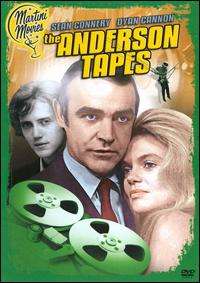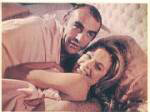Who is the blogger?
Video Trailer Collection
Picks from movies shown on TVOntario's Saturday Night at the Movies
Priest (1994)
 “Priest” (1994) is a difficult movie tackling a difficult subject. It holds up for scrutiny the many conflicts of being a modern-day Roman Catholic priest. Upon arrival at his new parish, Father Pilkington (Linus Roache) quickly becomes embroiled in a series of no-win situations. His fellow priest (Tom Wilkinson) is
“Priest” (1994) is a difficult movie tackling a difficult subject. It holds up for scrutiny the many conflicts of being a modern-day Roman Catholic priest. Upon arrival at his new parish, Father Pilkington (Linus Roache) quickly becomes embroiled in a series of no-win situations. His fellow priest (Tom Wilkinson) is 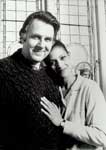 having a clandestine affair with the maid; a young parishioner reveals while in the confessional that she is the victim of incest; and he himself is caught in compromising circumstances in an ongoing homosexual relationship. The ready answers of Father Greg’s conservative version of Roman Catholic faith appear to be no match for the very real problems of real life in his very ordinary English parish. A crisis of faith ensues for Father Greg. His fellow clergy and the parish in general are dragged along unwittingly and unwillingly.
having a clandestine affair with the maid; a young parishioner reveals while in the confessional that she is the victim of incest; and he himself is caught in compromising circumstances in an ongoing homosexual relationship. The ready answers of Father Greg’s conservative version of Roman Catholic faith appear to be no match for the very real problems of real life in his very ordinary English parish. A crisis of faith ensues for Father Greg. His fellow clergy and the parish in general are dragged along unwittingly and unwillingly.
Although most of the crises in the film revolve around the  depiction of a mangled sexuality, on a more global level, the sex is just a window through which to see more deeply into the soul, into what it means to be human. In spite of the brouhaha that the film engendered when originally released, this film endures in its
depiction of a mangled sexuality, on a more global level, the sex is just a window through which to see more deeply into the soul, into what it means to be human. In spite of the brouhaha that the film engendered when originally released, this film endures in its 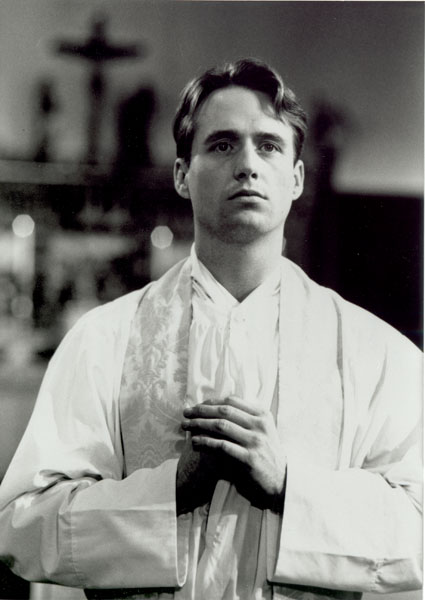 unflinching look at a certain situation in the Church today. That being said, the film is not totally devoid of either the hope or the redemption that the Church is supposed to be famous for. Like the rest of what is depicted in the film, it’s just not that simple.
unflinching look at a certain situation in the Church today. That being said, the film is not totally devoid of either the hope or the redemption that the Church is supposed to be famous for. Like the rest of what is depicted in the film, it’s just not that simple.
Also shown on Saturday Night at the Movies was another film underscoring high drama resulting from the secrecy of the confessional, Alfred Hitchcock’s “I Confess”.
>>More to see: Looking for more out of life?
See the video trailer for "Priest" (1994). See also the climactic final scene of the movie here.
In and Out (1997)
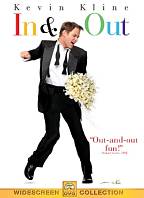 “In and Out” (1997) starring Kevin Kline, Tom Selleck and Joan Cusack is all about the influence of Hollywood on the lives of everyday people living in ordinary places. But isn’t it about a gay high school teacher coming out of the closet? But I thought it was about an unassuming English teacher “being outed” by his former pupil who happened to make a chance remark about his former teacher’s sexual orientation while receiving an Academy
“In and Out” (1997) starring Kevin Kline, Tom Selleck and Joan Cusack is all about the influence of Hollywood on the lives of everyday people living in ordinary places. But isn’t it about a gay high school teacher coming out of the closet? But I thought it was about an unassuming English teacher “being outed” by his former pupil who happened to make a chance remark about his former teacher’s sexual orientation while receiving an Academy 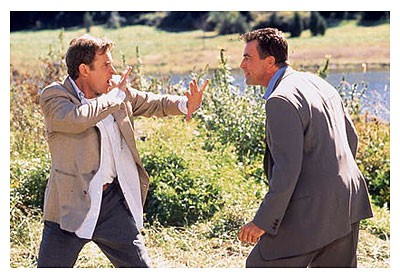 Award. It is all rather confusing. Some people, like Tom Selleck’s character, bigwig reporter Peter Malloy, seem to have perfect clarity about these things. But as for Mr. Howard Brackett himself (Kevin Kline), his fiancée (Joan Cusack), his parents, his friends and pretty much the rest of the world, it all comes as a big surprise.
Award. It is all rather confusing. Some people, like Tom Selleck’s character, bigwig reporter Peter Malloy, seem to have perfect clarity about these things. But as for Mr. Howard Brackett himself (Kevin Kline), his fiancée (Joan Cusack), his parents, his friends and pretty much the rest of the world, it all comes as a big surprise.
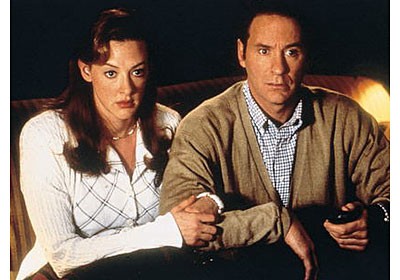 Naturally enough, neither Mr. Brackett nor his fiancée of quite some time were at all suspicious as they carried on with their extraordinarily commonplace lives. And quite naturally, everything and everyone is thrown into a tizzy once the big “revelation” has been announced on national television. From there on in, everything gets re-examined, re-decided and recast simply on the say-so of the newly minted Hollywood star (played by Matt Dillon). The aftershock comes with quite hilarious results,
Naturally enough, neither Mr. Brackett nor his fiancée of quite some time were at all suspicious as they carried on with their extraordinarily commonplace lives. And quite naturally, everything and everyone is thrown into a tizzy once the big “revelation” has been announced on national television. From there on in, everything gets re-examined, re-decided and recast simply on the say-so of the newly minted Hollywood star (played by Matt Dillon). The aftershock comes with quite hilarious results, 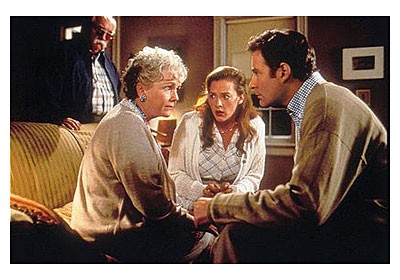 naturally enough. But naturally I wonder who has the bigger problem – Howard Brackett with his questions about his sexual orientation or the rest of us who appear to be so disposed as to believe anything we hear (as long as it is salacious and announced on national television). Fortunately for all concerned, “In and Out” is a comedy and the explorations of the vagaries of human nature remain lighthearted and are often treated in a quite funny manner.
naturally enough. But naturally I wonder who has the bigger problem – Howard Brackett with his questions about his sexual orientation or the rest of us who appear to be so disposed as to believe anything we hear (as long as it is salacious and announced on national television). Fortunately for all concerned, “In and Out” is a comedy and the explorations of the vagaries of human nature remain lighthearted and are often treated in a quite funny manner.
>> Real Life Story: DJ was a young man who was confused about a lot of things in life. Eventually he banged into some hard realities that led to deep life change.
>>More to see: Looking for more out of life?
Don't miss the entire dance sequence in Howard's "Real Men Don't Dance" routine. Catch the trailer for "In and Out" (1997).
The Anderson Tapes (1971)
>>More to see: Looking for more out of life?
>>Real Life Story: David found he had to stay on top in a world of petty crimes fueled by a drug addiction. It had to end somewhere. And then things got better.
See the original trailer for "The Anderson Tapes" (1971). View also three film clips with co-stars Dyan Cannon, Christopher Walken and Alan King.
Dominick and Eugene (1988)
 “Dominick and Eugene” (1988) has Tom Hulce and Ray Liotta play the parts of twin brothers, one of whom is slightly mentally retarded while the other studies to be a doctor. Hulce plays the slow witted brother. He exchanges comic books with an 11 year old boy on his garbage pick up route, loves pretending he is the Incredible Hulk and has problems remembering his responsibility to walk the dog. The brother played by Ray Liotta is saddled with some of the “adult” concerns of life; trying to plan his medical career, making progress in his love life and keeping his somewhat naïf brother out of trouble with drug dealers, hookers and neighbourhood thugs. Jamie Lee Curtis, the love interest for Gino, finds out that she really doesn’t know what she’s getting into by
“Dominick and Eugene” (1988) has Tom Hulce and Ray Liotta play the parts of twin brothers, one of whom is slightly mentally retarded while the other studies to be a doctor. Hulce plays the slow witted brother. He exchanges comic books with an 11 year old boy on his garbage pick up route, loves pretending he is the Incredible Hulk and has problems remembering his responsibility to walk the dog. The brother played by Ray Liotta is saddled with some of the “adult” concerns of life; trying to plan his medical career, making progress in his love life and keeping his somewhat naïf brother out of trouble with drug dealers, hookers and neighbourhood thugs. Jamie Lee Curtis, the love interest for Gino, finds out that she really doesn’t know what she’s getting into by 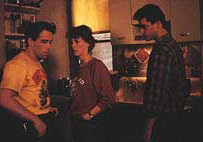 getting involved with her fellow medical student. She’s caught in the middle.
getting involved with her fellow medical student. She’s caught in the middle.
There’s a bit to work out in the space of two hours. Some startling revelations relating to manslaughter, child abuse and kidnapping could be interpreted by the overly cynical film critic to be contrived and overly predictable vehicles for sentimentality. I prefer to see the events and the characters as true to life. It may be hard for some to believe, 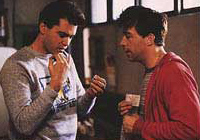 but people like this and situations like this really do exist. I for one have met up with some of them. The interpretation of the movie may rest more with the inner state of mind of the reviewer than the actual skill of the actors, directors and writers involved in the movie making. It’s a film that could go either way. I personally put a full three hankie warning on the film (with lots of nose blowing and tear wiping anticipated for anyone who is the least bit emotionally engaged).
but people like this and situations like this really do exist. I for one have met up with some of them. The interpretation of the movie may rest more with the inner state of mind of the reviewer than the actual skill of the actors, directors and writers involved in the movie making. It’s a film that could go either way. I personally put a full three hankie warning on the film (with lots of nose blowing and tear wiping anticipated for anyone who is the least bit emotionally engaged).
>>More to see: Looking for more out of life?
>>Real Life Story: Jimmy’s working class parents weren’t prepared that day when they sent their teenage son to the corner store. What happens in the families of an innocent victim touched by gang violence?
See a video clip from "Dominick and Eugene" (1988)
The Spy Who Came in from the Cold (1965)
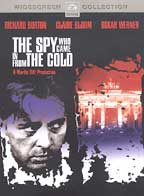 In “The Spy Who Came In From The Cold” (1965), John le Carré’s influential novel of cold war espionage comes to life with Richard Burton playing the central character. Alec Leamas is a far cry from the super suave super-spy, James Bond. There’s none of the gadgetry and high gloss finish for the ordinary agent Leamas who gets to visit such exotic destinations as a forest hut, a cement cell
In “The Spy Who Came In From The Cold” (1965), John le Carré’s influential novel of cold war espionage comes to life with Richard Burton playing the central character. Alec Leamas is a far cry from the super suave super-spy, James Bond. There’s none of the gadgetry and high gloss finish for the ordinary agent Leamas who gets to visit such exotic destinations as a forest hut, a cement cell  and an austere courtroom in nowhere town, East Germany thanks to his exciting chosen profession as a spy. The enduring points of interest from the film (and the novel) do not come from glamourous locations, steamy sex scenes or fantastic special effects that accompany the adrenalin pumping pursuits of the secret agent. This black and white film features things that are a little more low key (not to mention low budget). Complex dialogue, interesting character development and moral dilemma
and an austere courtroom in nowhere town, East Germany thanks to his exciting chosen profession as a spy. The enduring points of interest from the film (and the novel) do not come from glamourous locations, steamy sex scenes or fantastic special effects that accompany the adrenalin pumping pursuits of the secret agent. This black and white film features things that are a little more low key (not to mention low budget). Complex dialogue, interesting character development and moral dilemma 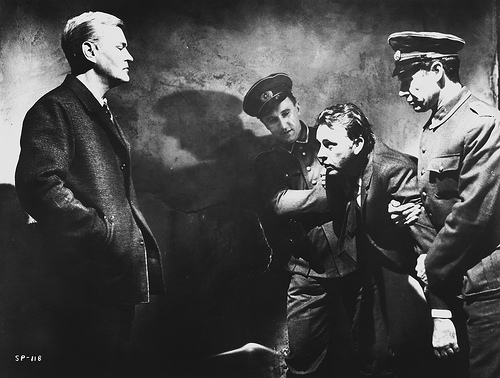 sustain one’s attention and actually leave one with something to think about after it’s all over. Move Mr. Bond. No matter what worthy actor they get to play the eternally youthful 007, he won’t be a match for Burton’s rather gritty Alec Leamas à la le Carré.
sustain one’s attention and actually leave one with something to think about after it’s all over. Move Mr. Bond. No matter what worthy actor they get to play the eternally youthful 007, he won’t be a match for Burton’s rather gritty Alec Leamas à la le Carré.
See a very interesting SNAM “Interview” that includes material on John le Carré’s spy novels. “The Deadly Affair" (1966), screened on the same evening on Saturday Night at the Movies is also reviewed on Midnight Oil.
You can try listening to the original novel on audiobook.
>>More to see: Looking for more out of life?
>>Real Life Story: Priscilla escaped oppression while living in an Eastern block country under Communist rule.
See the trailer for "The Spy Who Came in from the Cold" (1965)





